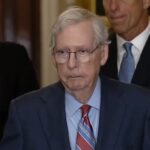CNN Exposes Minnesota’s COVID-19 Fraud Scandal: Governor Tim Walz Under Fire
In a shocking revelation, CNN recently aired a scathing segment on Minnesota Governor Tim Walz, highlighting his administration’s role in allowing the largest COVID-19 fraud scheme in the nation. The network’s investigative review of state audits suggests that Governor Walz turned a blind eye to rampant fraud within his state, particularly through the “Feeding Our Future” program. This scandal raises serious questions about the oversight of federal funds meant to assist children in need during the pandemic.
According to the Department of Justice, the Feeding Our Future initiative was intended to distribute nearly $250 million in federal tax dollars to provide meals for children affected by the pandemic. However, the funds never reached the intended recipients. Instead, the money was funneled into personal purchases, with dozens of individuals involved in the scheme using it to buy luxury homes, cars, and even a suburban bar and restaurant. Federal indictments have been filed, but the damage has been done.
CNN’s investigation directly implicates Governor Walz and his administration, pointing out that they defended their oversight of the program even after the fraud was uncovered. The network’s reporting has brought the issue to the forefront, casting a spotlight on the administration’s failure to ensure proper controls over pandemic relief funds.
Political Backlash
The fallout from this scandal has extended far beyond Minnesota. Commentators and public figures from across the political spectrum are calling for accountability. Gregg Re, a political commentator, noted how widespread fraud in programs like Feeding Our Future may be a contributing factor to FEMA’s financial struggles, stating, “This kind of fraud is how FEMA went from ‘tremendously prepared’ to ‘out of funds’ in three months.” Re’s comments underscore a growing frustration with how government agencies managed federal pandemic relief funds, many of which are now facing massive deficits.
Similarly, Collin Rugg, the original whistleblower of the fraud on Twitter, expressed his disbelief at the lack of accountability in the current administration. He highlighted Secretary of Homeland Security Alejandro Mayorkas’ previous claims that FEMA was well-prepared for the hurricane season, only for the agency to now declare itself underfunded. “Literally nothing this administration says can be taken seriously,” Rugg tweeted, capturing the mounting public skepticism towards the government’s pandemic response efforts.
The Growing Demand for Accountability
Amid the backlash, questions have been raised about whether anyone has been held responsible for this massive fraud. RedWave Press, a media outlet, tweeted: “Has anyone been arrested or charged in this scandal?” While federal indictments have been issued, the public’s demand for accountability from top state officials, including Governor Walz, continues to grow.
The Feeding Our Future scandal is emblematic of a larger national issue regarding the mismanagement of COVID-19 relief funds. Across the country, states were tasked with distributing billions in federal aid, and cases like this one have shone a light on the difficulties in ensuring the funds reached those who needed them most.
With the upcoming elections, many are left wondering whether this scandal will affect Governor Walz’s political future. For now, the people of Minnesota and beyond are waiting to see if justice will be served and if measures will be taken to prevent such fraud from happening again.
Conclusion
As details of this fraud scheme continue to unravel, it is clear that the mismanagement of federal funds intended to aid those hardest hit by the pandemic has deeply eroded trust in the government. Governor Tim Walz, once praised for his pandemic response, now faces mounting scrutiny as his administration is at the center of what is being called the largest COVID-19 fraud in the country. The fallout from this scandal is far from over, with both state and federal authorities under pressure to ensure accountability and restore faith in how public funds are handled.





